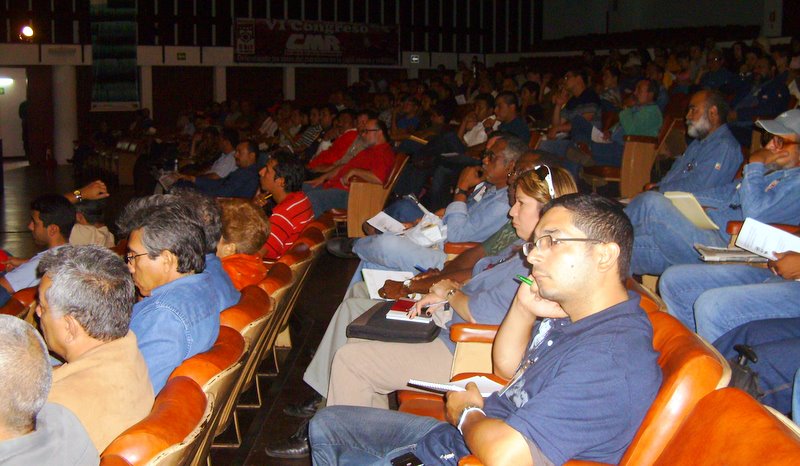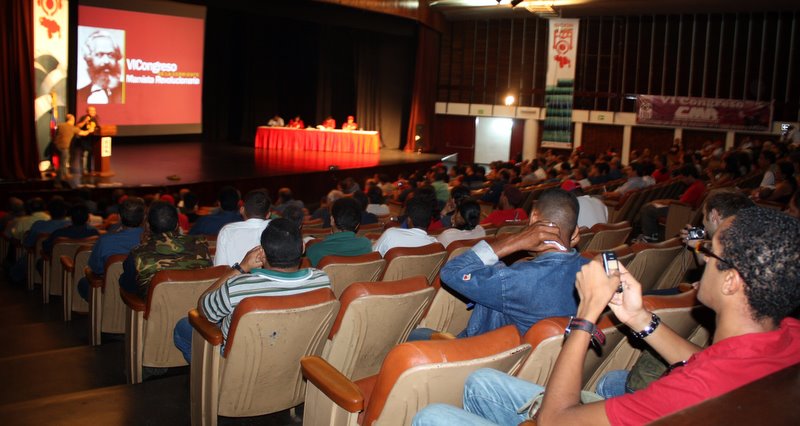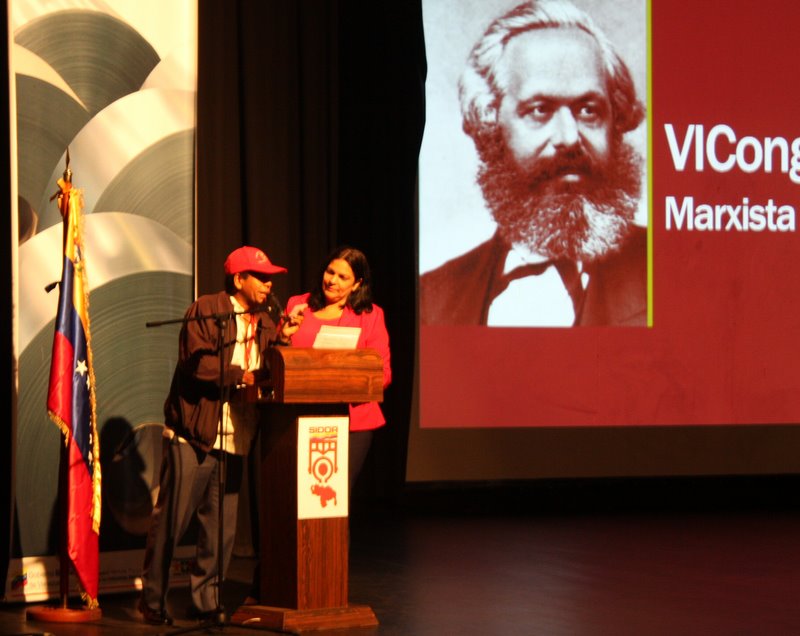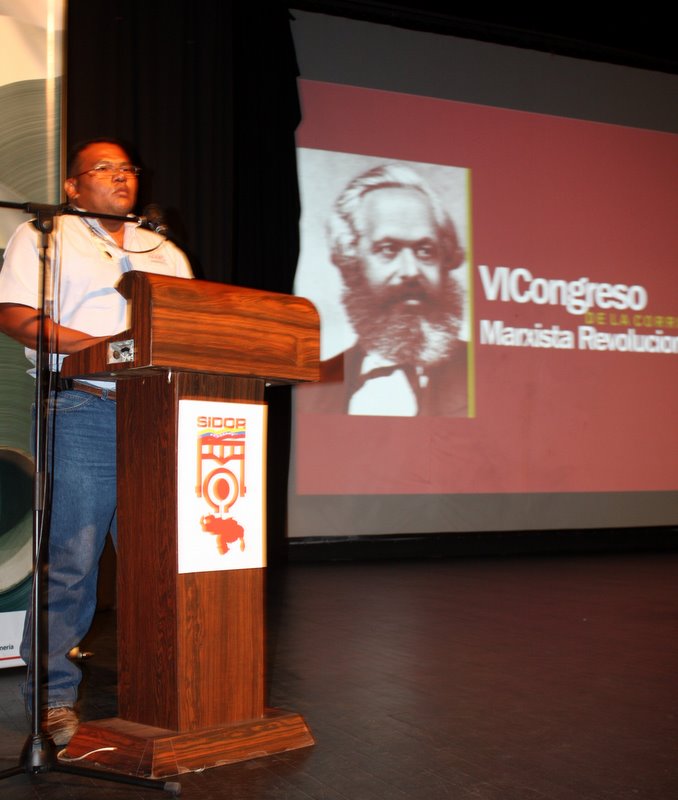Around 300 people took part in the opening session of the sixth congress of the CMR held at the huge SIDOR steel plant in the state of Bolivar, which was nationalized by President Chávez a year ago, as a result of a tremendous struggle by the workers. Workers and youth from many important factories were present, marking an important development in the forces of the IMT in Venezuela.
Among those present were workers from SIDOR, members of the Revolutionary Front of Steelworkers, who organized the event, leaders of the United Steel Workers of SIDOR (SUTISS), including the present and the former general secretaries, as well as trade unionists from ALCASA, Ferrominera and other nationalized basic industries in the highly proletarianized state of Bolivar. There were also delegates and other guests of the CMR Congress, among them many representatives from the labour movement of the state of Anzoategui (Mitsubishi, Vivex, which has been occupied for 6 months by its workers, Macusa and the Hotel Punta Palma); leaders from Inveval, a factory run under workers' control in Los Teques, trade unionists from PDVSA in the state of Zulia, as well as workers from PDVSA in Maturín and San Tomé. Aside from the state of Bolivar, there were comrades from the states of Vargas, Distrito Captital, Miranda, Zulia, Mérida, Táchira, Anzoategui, Portuguesa, Monagas and Lara.

In the centre of the hall, an image of Karl Marx was projected, along with the words: "Sixth Congress of the Revolutionary Marxist Current." A giant banner on one side of the hall also proclaimed the CMR Congress with the words: "Defending the Ideas of Marxism in the Working Class and in the PSUV."
You could feel the enthusiasm in the hall among the participants. This congress was clearly a giant step forward for the CMR. Not only because it was held in SIDOR, a factory complex so closely identified with the Venezuelan labour movement, but because the opening session was held in conjunction with the Revolutionary Front of Steelworkers, which has carried on a tireless struggle for workers' control within the factory as the only way of making the slogan "Socialist SIDOR" a reality.
 The event, which had been promoted through leaflets distributed at the factory gates, was opened by Miguel Álvarez, executive director of SIDOR, who in the name of the president of SIDOR and the Minister of Basic Industry and Mines, greeted the participants and identified himself as a member of the Revolutionary Front of Steelworkers. Álvarez indicated that SIDOR could only be considered socialist if the workers were "at the forefront of the company."
The event, which had been promoted through leaflets distributed at the factory gates, was opened by Miguel Álvarez, executive director of SIDOR, who in the name of the president of SIDOR and the Minister of Basic Industry and Mines, greeted the participants and identified himself as a member of the Revolutionary Front of Steelworkers. Álvarez indicated that SIDOR could only be considered socialist if the workers were "at the forefront of the company."
The next speaker was Elisabeth Alvés, leader of the CMR and vice-president of the CVG, who read out a list of workers, peasants, and young people assassinated by the counter-revolution and the paramilitaries since the beginning of 2009, including the recent killing of the leader of the Toyota workers' union, two workers from Mitsubishi and Macusa, and most recently, a young PSUV activist killed while setting up a registration centre in Caricuao, Caracas. Elisabeth explained that we need to end the impunity with which the right wing acts against the revolutionary militants and emphasised that "we can only end the assassinations if we put and end to the capitalist system, which remains very much alive in our country, and which is the cause of this violence."
Miguel Álvarez also spoke on this point and explained that the recent death of a SIDOR worker in a traffic accident should also be considered a killing by the capitalist system, due the decay of the transportation system in the name of maximum profits, which was the real cause of his death. These words were followed by a sombre minute of silence.
The next speaker was Jorge Martín, member of the International Secretariat of the International Marxist Tendency, who paid homage to the workers of SIDOR, who through their struggle for expropriation of the factory, made it possible for these kinds of events to be held within the plant's facilities. These words were met with a heart-felt ovation of thanks by all present. Jorge explained that the crisis we are living through is not a "crisis of the neo-liberal model," an idea recently put forward by Ignacio Ramonet; rather, it is a classical crisis of capitalist over-production. Jorge explained that even according to the IMF, this was the worst global crisis of capitalism since the 1930s, and that it was having important effects on the consciousness of millions of workers around the world. After analysing the crisis of capitalism and its impact on workers' and their consciousness, Jorge explained some of the challenges he sees facing the Venezuelan Revolution.
In his opinion, the main challenges are centred on the fact that like the state apparatus, the economy remains fundamentally capitalist. He also stated that the economy needs to be expropriated by the state, and that the state should be in the hands of the workers. "This task can only be carried out by the working class." He also criticized the reformists and bureaucrats who assert that, "the working class does not exist. If there is no working class in Venezuela, who saved the oil industry during the bosses' lockout in late 2002? Who was it that converged from around the country to Anaco to guarantee the gas supplies?" He ended his presentation by saying, "The Venezuelan Revolution is already an international inspiration, and a Socialist Venezuela would be a colossal point of reference for the workers and oppressed of the world."
Richard La Rosa, Secretary of the New Generation Workers' Union at the Mitsubishi Auto Company (Singetram), was the next speaker. Richard underlined the point that the struggle of the Mitsubishi workers had reached the furthest limits possible of the trade union struggle, and had become converted into a political struggle. To end the enslavement of the workers by capitalism, it is necessary to "nationalize the banks and the big companies, and put them at the service of the people, under the control of the workers." Richard outlined the key points in the heroic struggle of the Mitsubishi workers, during which, despite reason and the law being on their side, the workers were confronted by a vicious response by the judicial and police apparatus, which ended with the killing of two workers. Despite all the difficulties, the workers had won 90 percent of their demands, including a guarantee that none of the work done at the plant would be outsourced. He also explained the role that the CMR had played in the struggle, helping to politically orient the union leadership, and that this is why they had enthusiastically joined the CMR.
Richard also explained the need for the unity of the working class, which is being paralysed by the leadership of the UNT, which is more interested in personal prestige than the workers' needs and struggles. The only way to break through these divisions is to convene a "national congress of workers, trade unionists and other workers' representatives to rebuild the UNT on the basis of a militant program of struggle."
Richard's intervention had a profound impact on the audience, who interrupted his speech several times with applause. Aside from being an excellent speaker, he showed himself to be a workers' leader with clear ideas and an unbreakable will in the struggle against capitalism.
He was followed by Juan Ignacio Ramos, president of the Frederick Engels Foundation and a leader of the IMT in Spain. He denounced the media attacks on and lies about the Revolution, especially in Spain, and explained that this is because they fear it will become an example for the workers in Spain. He also discussed the question of freedom of expression in Venezuela, denouncing the hypocrisy of the recent declaration by the European Union.
 Jesús Pino, Revolutionary Front of Steel Workers, and Elisabeth Alves, CMR "Freedom of expression is a class question," he said, highlighting his point with the example of TV Española's blocking out the boos received by the King of Spain in the final match of the King's Cup. That same monarch scandalously told president Chávez to "shut up," although he has absolutely zero democratic credentials, seeing as he was appointed to his position by Franco, the murderer of countless Spanish workers during the Civil War. These words unleashed an energetic round of applause from the audience.
Jesús Pino, Revolutionary Front of Steel Workers, and Elisabeth Alves, CMR "Freedom of expression is a class question," he said, highlighting his point with the example of TV Española's blocking out the boos received by the King of Spain in the final match of the King's Cup. That same monarch scandalously told president Chávez to "shut up," although he has absolutely zero democratic credentials, seeing as he was appointed to his position by Franco, the murderer of countless Spanish workers during the Civil War. These words unleashed an energetic round of applause from the audience.
Juan Ignacio applauded the nationalisation of the Banco de Venezuela (formerly owned by the Spanish consortium Santander), and explained that the Chávez government should not stop there, but should nationalize the entire banking system, starting with the Spanish multinationals, and adding that there should be "no compensation paid." This was also enthusiastically received by the audience.
Next was César Olarte, on behalf of the Revolutionary Front of Steelworkers, who insisted on the need for workers' control through workers' councils, as the next and necessary stage for SIDOR, now that it has been nationalized. César insisted that it was crucial that the unions get beyond fighting only for economic demands, and that they get fully behind the political struggle for socialism.
Before the session ended, Nelson Rodríguez, a worker from Inveval and leader of the CMR, spoke in name of Freteco and the occupied factories MDS, Gotcha, INAF and Vivex. Nelson denounced the sabotage being carried out against the occupied factories and those already nationalized and under workers' control by bureaucratic sectors of the state. He used the concrete examples of Inveval, Vivex, and Inaf, where the workers come into conflict over and over again with the bureaucrats and reformists who often violate the direct orders of president Chávez.
The session was closed by Elisabeth Alvés, who summarized the challenges that Venezuela faces as an exporter of raw materials, and the need to plan the economy in order to develop the country, and how this could only happen under workers' control.
To end the session, there was a musical performance by Pedro Urbino, who sang songs by Alí Primera, among others.
Without a doubt, this was a tremendous turning point in the development of the CMR, a reflection of the qualitative influence and connections it has in the workers' and revolutionary movement in Venezuela.
More photographs

